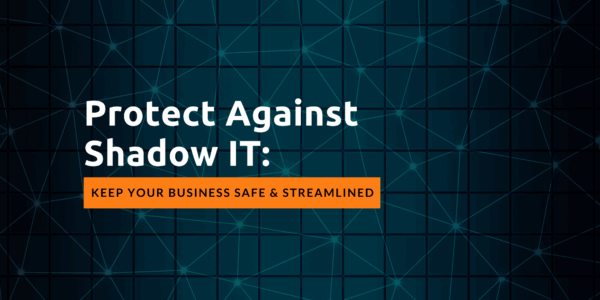In today’s fast-paced workplaces—especially across Texas—employees are always looking for easier, faster ways to get…

Cyber Insurance: A Critical Safety Net in the Digital Age
Guest post by John Burkhalter:
In today’s increasingly digital world, the risk of cyber threats and attacks has become a pressing concern for businesses of all sizes. As technology advances, so do the methods employed by cybercriminals. To address this rising threat, many organizations are turning to cyber insurance as a way to mitigate potential financial losses resulting from cyber incidents.
What is Cyber Insurance?
Cyber insurance, also known as cybersecurity insurance or cyber liability insurance, is a type of insurance designed to protect organizations from the financial consequences of cyberattacks, data breaches, and other digital security threats. This coverage can vary depending on the insurer and the policy, but it generally aims to help companies manage the costs associated with cyber incidents, such as:
- Data breaches: Unauthorized access to sensitive personal or company data.
- Ransomware attacks: Malicious software that locks access to data until a ransom is paid.
- Business interruption: Loss of revenue due to system downtime or other disruptions caused by a cyberattack.
- Cyber extortion: Threats of releasing or destroying data unless a ransom is paid.
- Reputation damage: Loss of public trust or brand value after a data breach or cyberattack.
Cyber insurance policies typically cover expenses such as legal fees, data recovery, notification costs to affected customers, and public relations efforts to restore a company’s reputation.
Why is Cyber Insurance Important?
The importance of cyber insurance is evident given the surge in cybercrime. According to recent statistics, cybercrime across the globe is expected to cost over $1T annually next year. No business is immune, whether it’s a small startup or a large corporation. Cyber insurance provides several key benefits:
- Financial Protection: Cyberattacks can result in massive costs, including ransom payments, legal settlements, fines, and remediation efforts. Without insurance, organizations might face devastating financial burdens that can jeopardize their existence.
- Business Continuity: Insurance can help companies recover quickly from cyber incidents, ensuring business operations resume faster with minimal disruption.
- Risk Management: Many insurers require companies to implement strong cybersecurity measures before issuing a policy, prompting organizations to adopt better security practices and reduce their vulnerability.
- Legal Support: Cyberattacks often lead to legal liabilities, including regulatory fines for failing to protect consumer data. Cyber insurance can help cover legal costs, penalties, and settlements.
- Reputation Recovery: A data breach can damage a company’s reputation and customer trust. Cyber insurance often includes coverage for reputation management services and public relations efforts to minimize the long-term damage.
Types of Cyber Insurance Coverage
Cyber insurance policies vary greatly depending on the needs and risks associated with a particular business. However, most policies include the following types of coverage:
- First-Party Coverage: This protects the organization itself. It typically includes:
- Data restoration: Covering costs related to recovering or rebuilding lost or corrupted data.
- Business interruption: Compensation for lost income due to system downtime caused by a cyber incident.
- Ransomware recovery: Covering the costs associated with ransomware attacks, including ransom payments if necessary.
- Third-Party Coverage: This provides protection against claims made by others, such as customers or partners. It generally includes:
- Liability for data breaches: Covering the costs associated with a data breach that affects clients, including notification and credit monitoring services.
- Privacy liabilities: Addressing legal claims resulting from unauthorized data exposure.
- Regulatory fines and penalties: Covering fines for non-compliance with data protection regulations like GDPR or HIPAA.
Key Considerations When Purchasing Cyber Insurance
When purchasing cyber insurance, businesses need to evaluate their risks, needs, and the level of coverage required. Here are several factors to consider:
- Risk Assessment: Businesses should conduct a thorough risk assessment to identify potential vulnerabilities. The insurer may also require a security audit to determine the level of coverage based on the company’s cybersecurity posture.
- Policy Terms and Exclusions: Policies vary in coverage, and it’s important to understand what is included and what is excluded. Some policies might not cover certain types of cyberattacks or might limit coverage for high-risk areas, such as ransomware.
- Data Protection Requirements: Insurers may require businesses to implement specific cybersecurity measures before they can issue a policy. This might include encrypting sensitive data, using multi-factor authentication, and regularly updating software systems.
- Claims Process: It’s vital to understand the claims process, including how to report an incident, how quickly claims are processed, and what documentation is required. Some insurers provide access to incident response teams to assist with managing cyber events.
- Cost: The cost of cyber insurance varies based on factors such as the size of the business, the amount of data it handles, its cybersecurity posture, and the scope of coverage required. While premiums can be expensive, they are often a fraction of the cost of a significant cyber incident.
The Future of Cyber Insurance
As cyber threats continue to evolve, the landscape of cyber insurance is also changing. Insurers are constantly adapting their policies to cover new risks, such as attacks on the Internet of Things (IoT), artificial intelligence vulnerabilities, and supply chain attacks. Moreover, the integration of cyber insurance with broader risk management strategies is becoming increasingly important.
The growth of cyber insurance is expected to continue as businesses realize the financial and operational risks posed by cyber threats. However, businesses should view cyber insurance as one part of a comprehensive cybersecurity strategy that includes robust technical defenses, employee training, and proactive monitoring.
Conclusion
Cyber insurance is no longer a luxury or afterthought but a necessary investment in the modern digital era. While it cannot prevent cyberattacks, it can provide invaluable protection from the financial and reputational damage they cause. By selecting the right coverage, businesses can ensure that they are prepared for the inevitable threats that come with operating in an increasingly connected world.
Take Your Business Further with Terminal B
Operational maturity isn’t just a goal — it’s a necessity for businesses striving to stay competitive. Terminal B helps you achieve it with strategic IT support, advanced cybersecurity, and tailored solutions that evolve as your business grows. By streamlining processes, mitigating risks, and enhancing system reliability, Terminal B empowers you to reach new levels of efficiency and resilience.
Don’t wait for disruptions to force change — take control of your operational maturity today.



